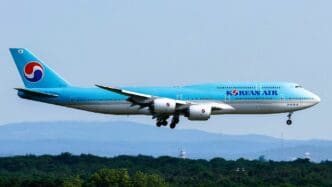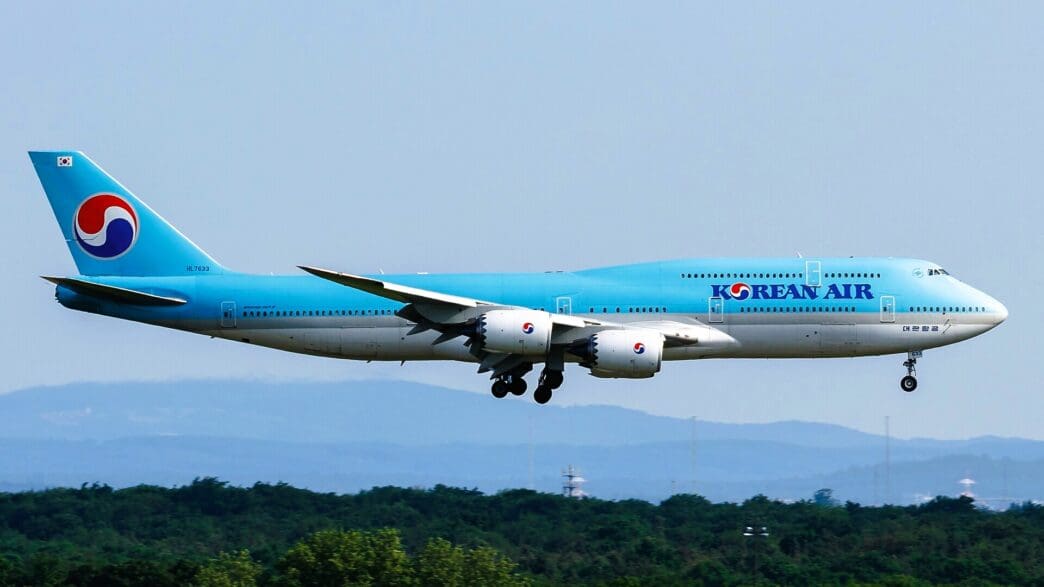Executive Summary
- Korean Air finalized a $36 billion agreement to purchase 103 Boeing aircraft, including 787, 777, and 737 passenger jets, and 777-8 Freighter cargo planes.
- The deal comes as President Trump presses trading partners to increase business with American companies, amidst broader US-South Korea trade discussions and tariffs.
- Beyond the aircraft order, South Korean companies like Hyundai Motor Group and Samsung’s shipbuilding division announced significant new investments and collaborations in the United States.
The Story So Far
- The substantial Korean Air order for Boeing aircraft is a direct consequence of President Donald Trump’s administration actively pressing trading partners, including South Korea, to increase business with American companies amidst ongoing trade discussions and tariff considerations. This deal aligns with a broader pattern where other nations have made similar large orders to strengthen trade ties, while also strategically positioning Korean Air to modernize its fleet and maintain competitiveness, especially as it proceeds with its merger with Asiana Airlines.
Why This Matters
- The substantial $36 billion Korean Air order for Boeing aircraft, alongside other significant South Korean investments, directly boosts US manufacturing and job creation, aligning with President Trump’s efforts to increase business with American companies and potentially influencing ongoing trade tariff discussions. This deal also reflects a broader trend of international partners strategically engaging with US firms to navigate trade negotiations, while simultaneously enabling Korean Air to modernize its fleet and enhance its global competitiveness.
Who Thinks What?
- Korean Air views the new aircraft order as a “pivotal moment” to modernize its fleet, maintain competitiveness, and support its ongoing merger with Asiana Airlines.
- Boeing considers the acquisition a “landmark agreement” that will support an estimated 135,000 jobs across the United States and contribute to its strong sales performance.
- President Donald Trump and the US government see the deal as a success in pressing trading partners to increase business with American companies, aligning with broader discussions on trade tariffs and strengthening economic ties with South Korea.
Korean Air and US aviation giant Boeing announced a significant deal on Monday worth approximately $36 billion for 103 new aircraft, as President Donald Trump continues to press trading partners to increase business with American companies. The agreement, unveiled during a high-level meeting in Washington, includes a mix of Boeing 787, 777, and 737 passenger jets, alongside 777-8 Freighter cargo planes, and comes amidst broader discussions between the US and South Korea regarding trade tariffs.
Aircraft Order Details and Strategic Importance
The extensive order encompasses 50 Boeing 737-10 passenger planes and 45 long-range jets, in addition to the eight 777-8 Freighter cargo planes. Walter Cho, Korean Air’s chief, stated that these new jets arrive at a “pivotal moment” for the South Korean flag carrier, enabling it to modernize its fleet and maintain competitiveness, particularly as it proceeds with its merger with Asiana Airlines.
Boeing’s commercial planes chief, Stephanie Pope, lauded the acquisition as a “landmark agreement,” highlighting its potential to support an estimated 135,000 jobs across the United States. This latest purchase brings Korean Air’s total orders and commitments for Boeing aircraft this year to over 150.
Broader Trade Engagements and Investments
The announcement followed a meeting between President Trump and South Korean President Lee Jae Myung in Washington, where discussions included the 15% tariffs imposed by the US on South Korea in July. The Korean Air deal was one of several agreements revealed during a gathering of government representatives and business leaders from both nations, attended by US Commerce Secretary Howard Lutnick and South Korea’s Trade Minister Kim Jung-kwan, alongside top executives from Samsung, Hyundai Motor Group, and Nvidia.
Further bolstering economic ties, South Korea’s Hyundai Motor Group declared an increase in its US investment from $21 billion to $26 billion. The company also unveiled plans to establish a new facility in the US capable of producing 30,000 robots annually. Additionally, Samsung’s shipbuilding division entered a collaboration with Oregon-based Vigor Marine Group to support maintenance operations for the US Navy, aligning with Seoul’s earlier commitment of $150 billion to the US shipbuilding industry.
Pattern of International Orders Amid Trade Pressure
The Korean Air order aligns with a pattern observed in other countries engaged in trade negotiations with the Trump administration. Japan, for instance, agreed to purchase 100 Boeing jets in July as part of its trade agreement with the US, and Indonesia’s flag carrier Garuda committed to 50 Boeing jets to help reduce US tariffs. These significant international orders have reportedly contributed to Boeing’s sales surpassing those of its European competitor, Airbus, even as Boeing navigates a series of recent crises, including fatal crashes and a mid-air blowout incident.
The jet order from Korean Air has been under consideration for some time, with Seoul indicating in March that an agreement with Boeing and US engine maker GE Aerospace was nearing completion. A separate deal with GE, valued at $13.7 billion, was also announced on Monday.
The substantial Korean Air order for Boeing aircraft underscores the intricate interplay between global commerce and political dynamics, particularly as President Trump advocates for increased US business. This deal, alongside other significant investments and collaborations, highlights South Korea’s commitment to strengthening economic ties with the United States amidst ongoing trade discussions and tariff considerations, while also strategically positioning Korean Air for future growth and competitiveness.








